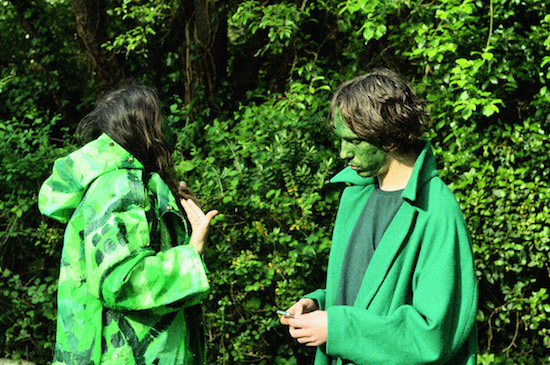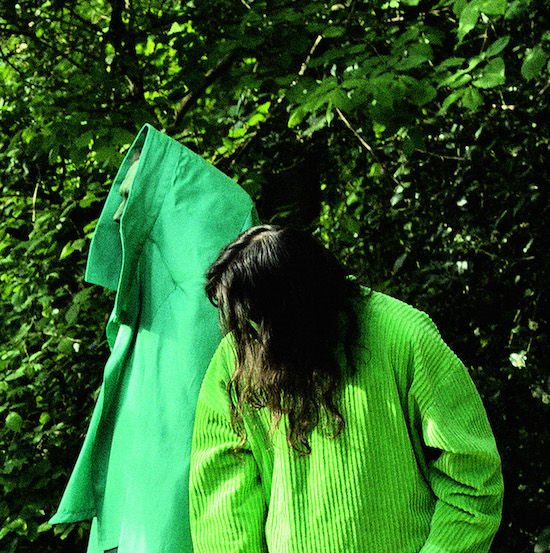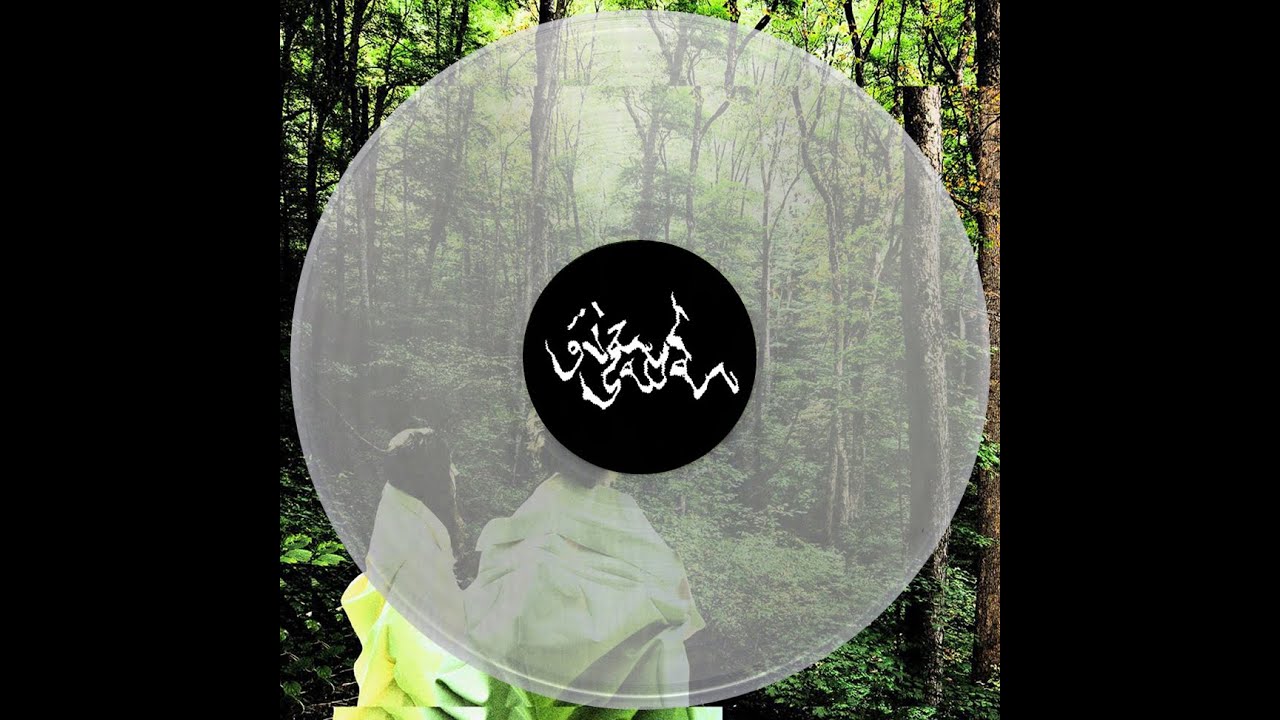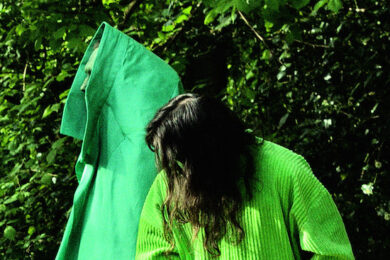Saturday, January 18, 2014, Arnolfini, Bristol: Low-end throb ‘n’ roll. Thick undulations summoned from the corner of a black room, bodies washed, minds mesmerised.
Thursday, August 14, 2014, The Waiting Room, London: Techno-not-techno assault. Raw power that threatens to obliterate the rest of the line-up. Don’t fuck with Giant Swan.
Wednesday, March 4, 2015, The Lexington, London: Throwing shards of glass at stoic shoegazers.
Saturday, April 11, 2015, Power Lunches, London: Dense, psychedelic intensity that comes in short, quickly shifting segments. Neon green light. Dance hard/bliss out.
Giant Swan never play the same set twice. The Bristol improv unit thrive off adventuring into the unknown, applying pressure on themselves, their audience and whatever sound system they’re playing through.
Members of long-running band The Naturals, Robin Stewart and Harry Wright sparked an offshoot by accident. The casual, freeform jam sessions they’d been having snowballed into a live operation. Friends from the Bristol scene encouraged their loud, heavy, unpredictable forays and, gig by gig, Giant Swan became a fully-fledged project.
The duo are something of an (unintentionally) well kept secret because of how new yet explosive they are. They’ve released one 12" via Bristol label Howling Owl, played a bunch of DIY shows and taken tours of Europe; fledgling in the grand scheme of things, but their live performances are exceptionally potent, recalling the ecstatic dance-not-dance music of early Holy Fuck and the pure WTF?! gristle and energy of the first Rezzett records.
Ahead of a booking at Bristol’s Simple Things Festival this month (which sees them creeping onto the same bill as Godspeed You! Black Emperor), we caught the pair to discuss the joy of merch, the infinity of pop and the way to reach aggressive sonics.
How did you end up with Bob Marley and Kesha on your merchandise?
Harry Wright: They represent parts of both our music tastes. Rob’s quite into reggae, I’m quite into pop music.
Robin Stewart: We feel like Bob Marley and Kesha would have gotten on, had the same kind of relationship that me and Harry have.
Would they enjoy your music?
RS: They’d probably hate it.
HW: Nah, they’d love it.
RS: We don’t really have a blues. I think Kesha and Bob Marley really look for the blues. But that was just a silly idea that we went for. And that’s kind of what Giant Swan is.
What’s the idea behind your new "not all drone is good drone" T-shirt range?
RS: People kept telling us that we were a drone band. We like a bit of drone here and there but we were saying that not all drone is good drone. Then a week later Harry said: "Oh yeah, I’ve done those tees with the slogan on." With the orange T-shirts, we just like big, bold, silly colours.
HW: We’re trying to bring nu rave back – we’re doing a collaboration with Shit Disco and Klaxons… They called us.
RS: We like the idea of having lots of merchandise, weird wares.
HW: We’ve got more T-shirts than we have songs.
You’re both in The Naturals, why did you decide to start Giant Swan?
HW: We’ve always done [Giant Swan] as a fun jam. A chance for us to experiment. We never meant to start a project, it kind of just took off.
RS: About 2009, I was working with a small art collective in Bristol and we were doing some projection work with [Bristol gallery] Arnolfini and I was tasked with doing some music for it, so I went to Harry and was like, "Can you record me doing some music?" and he mixed it and it was great. We kept meeting up; there was never a plan.
All the gigs we started getting were put on by our mates: Amos Childs [aka Young Echo member Jabu], Matt Loveridge [Fairhorns], Howling Owl. It developed naturally – probably because me and Harry spend so much time together!
Did you set out to make something that was closer to dance music than The Naturals?
RS: No.
HW: It came more from experimenting with pedals and sounds, having fun. That’s what we try and remember when we’re doing it.
RS: To be honest, the biggest mood maker we’ve come across is Harry breaking his arm about a year ago. That meant he couldn’t play guitar. Up until then Giant Swan had been two guitars. He had to totally reconfigure his live set-up and that meant we were using a lot more beats, big drums and it went on from there.
We were playing with a lot of bands that weren’t heavy enough, who were giving this impression of dance music that we didn’t recognise. So we thought we might as well do it heavier and more extreme and more enjoyable.
Can you explain your live set-up?
HW: It’s all live in terms of making music. I use a lot of samples and drum loops and an analogue drum machine. We never have a strict set. It could change depending on the show and how we’re feeling. We want to keep our parameters quite wide, so we can go off on one if we want. It’s more fun that way.
RS: The equipment I use is tied to the band aesthetic. I’m using a guitar and a microphone to generate all of the sounds I make, and we play through amps. The hardware and the amps implies a bit more participation on our part, which we take really seriously.
HW: People who play behind a glowing Apple logo, staying really still – that’s everything we stand against.
RS: That’s allowed us to develop relationships with other artists that we might not have had a relationship with. We can talk about other aspects of music that doesn’t just come down to someone’s new plug-in.
HW: Karen Gwyer and Gnod are good examples of that. They do the live dance music thing – it doesn’t have to be one thing or the other.

How do you write your music?
RS: It’s plug in and play, a lot of improvising. Our live show up until six months ago was entirely improvised. We’ve been on tour for most of the year, meaning we’ve consolidated a lot of movements in the set.
HW: We have points in our sets that we need to get to. But how we get there changes every time.
RS: We’re interested in repetition and momentum in all sorts of different styles of music. Coming back to pop and dub, the way those genres are constructed around integral parts. You could have the perfect chord sequence in a pop tune and the right sort of ingredients and it could feel infinite.
You never play the same set twice.
RS: They tend to be different every time. That’s dependent on whether or not the promoter has brought us amps, how much hardware we can carry…
HW: … if there’s a positive energy in the room.
RS: Last weekend we played at Liverpool Psych Fest and we were wandering around and it wasn’t that psychedelic or festive. We were on after this guy called Mai Mai Mai and he really split the crowd, playing some brutal music. It gave us clearance to really let loose and send out some aggressive sonics. We know what we’re capable of if the situation allows it. It comes down to being comfortable around one another…
HW: …we’ve been playing together for ten years, either in The Naturals or Giant Swan. We can trust in what each other is doing and we know how to react to one another. When we’re playing live, we might surprise each other by pressing the wrong button but that’s all part of the fun.
Your live sets are pretty explosive. Is it easy to transfer that energy onto record?
HW: It is quite hard because we have to really separate [playing shows and recording]. Our first record started out as us wanting to capture the live aspect but recently we’re trying to have more of a separation between the recording mindset and the live mindset.
Will you be adapting your sound to play in a festival setting?
RS: We’re stoked to play Simple Things and we feel like we’re able to come with what we know we can do. We’re quite versatile, we can move from being still to being really hectic. The size of the venue or the festival doesn’t affect us, we’d rather make sure one another is alright and we’re comfortable. We’ll do what we do and hopefully people will come with us, if not they’ll probably be watching Factory Floor again or something.
Giant Swan is out now on Howling Owl Records. Giant Swan play Simple Things Festival in Bristol on October 24; for full details and tickets, head here




